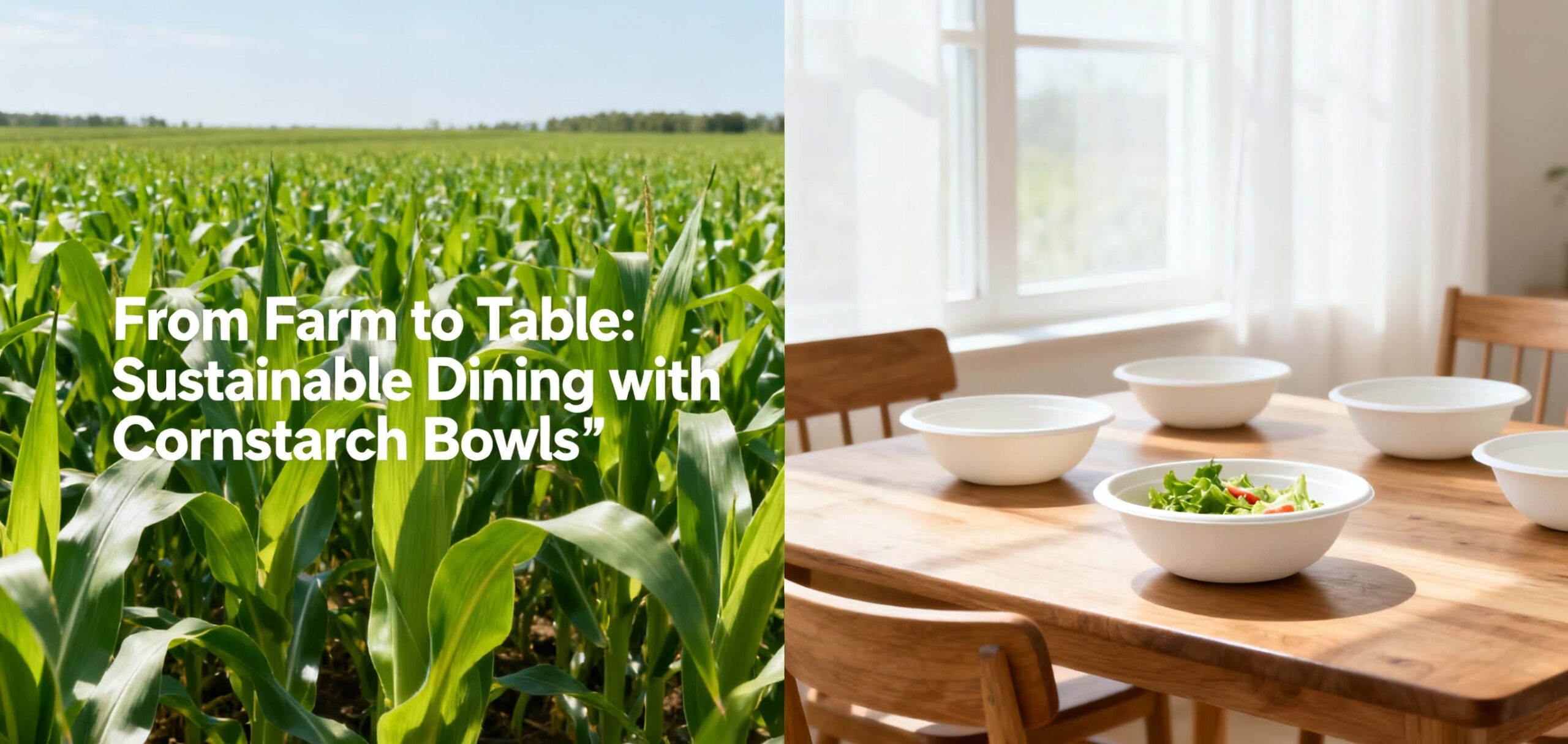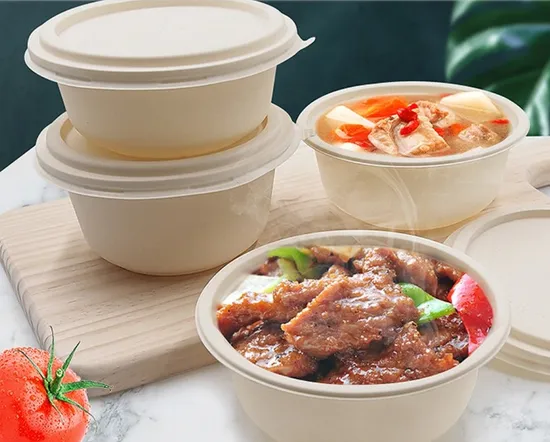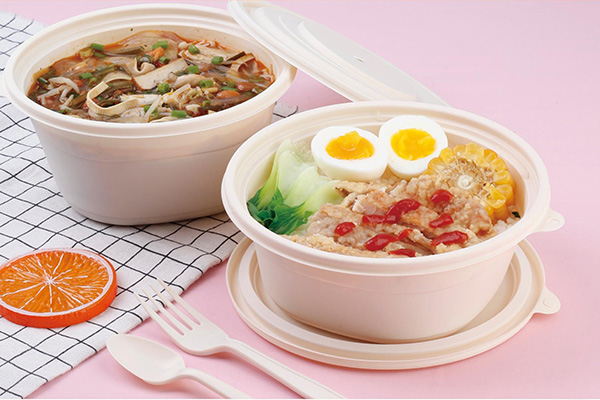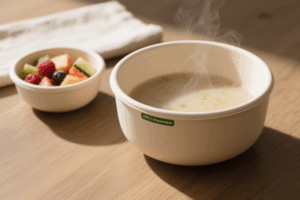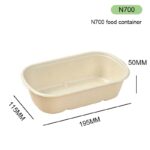Quick Summary
Cornstarch bowls are made from renewable plant starch and provide a safe, durable, and environmentally responsible alternative to traditional plastic tableware. DASHAN’s certified products meet international standards, are compostable, and ideal for restaurants, catering, and home use, helping businesses comply with global sustainability policies and meet growing consumer demand for eco-friendly dining solutions.
Introduction: The Rise of Sustainable Dining
In recent years, environmental sustainability has become a central focus for consumers, businesses, and governments worldwide. Single-use plastics, once ubiquitous in restaurants, cafes, and households, are now recognized as major contributors to pollution and climate change. Governments are introducing regulations to reduce plastic waste, while businesses seek practical, eco-friendly alternatives to meet consumer demand.
Among these alternatives, cornstarch bowls have emerged as a versatile, biodegradable, and sustainable option. These bowls are not only functional but also support a broader movement toward responsible consumption and production, aligning with the United Nations Sustainable Development Goal 12 (SDG 12). Experts such as Dr. Emily Green, a sustainability consultant, note that:
“Plant-based, compostable tableware is a key innovation for businesses looking to reduce environmental impact while maintaining operational efficiency.”
What Are Cornstarch Bowls?
Cornstarch bowls are made from renewable plant starch extracted from corn. The production process transforms cornstarch into durable, heat-resistant, and biodegradable tableware, suitable for both hot and cold foods. The manufacturing process typically involves:
-
Extracting starch from corn kernels
-
Mixing starch with natural additives for strength
-
Forming and molding into bowls
-
Drying and packaging the final product
Compared to traditional plastic bowls, cornstarch bowls are biodegradable, compostable, and free from harmful chemicals, making them safe for food contact.
Advantages of Cornstarch Bowls
Environmental Benefits
-
Biodegradability: Cornstarch bowls decompose naturally, reducing landfill waste and incineration-related emissions.
-
Carbon footprint reduction: Plant-based materials absorb CO₂ during growth, offsetting some emissions from production.
-
Support for circular economy: Used bowls can be composted, returning nutrients to the soil.
Practical Benefits
-
Durable and heat-resistant: Suitable for soups, salads, and hot meals.
-
Lightweight and portable: Ideal for takeout, catering, and events.
-
Convenient handling: Stackable, easy to clean, and compatible with most foodservice equipment.
Health & Safety
-
Non-toxic and food-safe: Free from BPA, PFAS, and other hazardous substances.
-
Certified standards: DASHAN cornstarch bowls comply with FDA, EU 10/2011, and SGS testing for safe food contact.
Applications in Various Settings
Restaurants & Cafes:
-
Perfect for hot soups, noodles, salads, and takeaway meals.
-
Supports environmentally conscious branding and customer satisfaction.
Catering & Events:
-
Lightweight and durable for large-scale events, festivals, and corporate catering.
-
Reduces single-use plastic waste while maintaining presentation quality.
Home Use:
-
Offers a convenient and sustainable option for daily meals.
-
Can be composted at home or disposed of responsibly, supporting household sustainability.
Retail & Supermarkets:
-
Pre-packaged meals can be served in cornstarch bowls, promoting eco-friendly consumption.
-
Enhances a brand’s commitment to sustainability, appealing to environmentally conscious customers.
DASHAN Cornstarch Bowls: Why Choose Them

Experience & Expertise: DASHAN has decades of experience in plant-based tableware production. Their cornstarch bowls are rigorously tested for durability, heat resistance, and food safety.
Advantages of DASHAN Products:
-
Certified compostable and biodegradable
-
Safe for food contact with international certifications
-
Durable and heat-resistant, ideal for both commercial and household use
-
Consistent quality and supply, supporting large-scale foodservice operations
Authoritativeness & Trustworthiness: Multiple studies highlight the environmental benefits of plant-based tableware. According to a 2023 report by the European Bioplastics Association, switching from plastic to compostable plant-based tableware can reduce greenhouse gas emissions by up to 60% per product lifecycle.
Policy Support and Global Trends
Government Policies Encouraging Sustainable Packaging:
-
United Kingdom: The 2025 Plastic Packaging Tax imposes fees on plastic packaging with less than 30% recycled content .
-
France: Bans single-use plastic cutlery and encourages biodegradable alternatives (France Environment).
-
Canada: Plans to ban certain single-use plastics by 2025 (Government of Canada).
Global Trends: Businesses are increasingly adopting plant-based tableware to comply with regulations and meet consumer demand for sustainable products. Cornstarch bowls are ideal for international operations due to their certified biodegradability and safety standards.
Tips for Businesses & Consumers
Businesses:
-
Audit existing tableware and identify plastic alternatives.
-
Partner with certified suppliers like DASHAN.
-
Communicate sustainability features to customers through labels and marketing.
Consumers:
-
Choose certified compostable cornstarch bowls.
-
Dispose of bowls through composting or eco-friendly waste channels.
-
Educate family and friends about reducing plastic use at home.
Conclusion: From Farm to Table
Cornstarch bowls represent a practical, safe, and eco-friendly solution for sustainable dining. From production using renewable corn starch to disposal through composting, these bowls reduce environmental impact while maintaining usability and aesthetic appeal.
DASHAN’s cornstarch bowls provide businesses and consumers with reliable, certified, and high-quality options for every dining scenario. By choosing plant-based tableware, we take a tangible step toward a greener future—one bowl at a time.
FAQ
-
What are cornstarch bowls made of?
-
Made from renewable corn starch, they are biodegradable, compostable, and safe for food contact.
-
-
Are DASHAN cornstarch bowls safe for hot foods?
-
Yes, they are heat-resistant and tested for durability with hot soups, noodles, and beverages.
-
-
Can cornstarch bowls be composted at home?
-
Yes, if they are certified for home composting; otherwise, industrial composting is recommended.
-
-
How do businesses transition to cornstarch tableware?
-
Audit current packaging, partner with certified suppliers, test performance, and communicate sustainability to consumers.
-
-
What global policies support using cornstarch bowls?
-
UK 2025 Plastic Packaging Tax, France’s single-use plastic ban, and Canada’s upcoming national ban on certain plastics.
-
References
-
UK Plastic Packaging Tax guidance (official) — Plastic Packaging Tax: steps to take (gov.uk)
-
Tax rate increase 2025 — Plastic Packaging Tax to increase from April 2025 (cieh.org)
-
Impact on small businesses — How the Plastic Packaging Tax is affecting small businesses (enterprisenation.com)
-
Recycled content requirements — Understanding the UK Plastic Packaging Tax: Key changes (valpak.co.uk)
-
Cornstarch packaging as a sustainable alternative — Corn Starch Food Packaging: A Sustainable Alternative (easyngreen.com)
Disclaimer & Copyright Notice
© 2025 Dashan Packing. All rights reserved.
This article is an original work created by the Dashan Packing editorial team.
All text, data, and images are the result of our independent research, industry experience,
and product development insights. Reproduction or redistribution of any part of this content
without written permission is strictly prohibited.
Dashan Packing is committed to providing accurate, evidence-based information and
to upholding transparency, originality, and compliance with global intellectual property standards.


